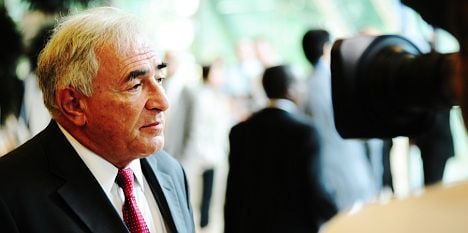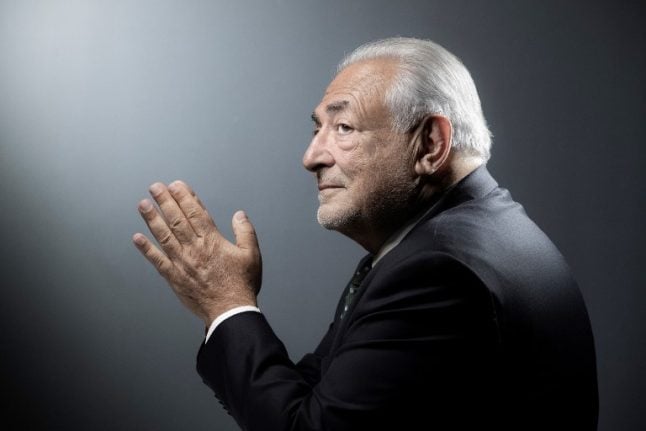Strauss-Kahn on Sunday said he had let down both his loyal wife and the French people, and admitted he had abandoned his hopes of running for president next year, but denied he had sexually assaulted two women who brought charges against him.
DSK
DSK regrets ‘moral failing’ in sex with maid
Dominique Strauss-Kahn's assertion that his encounter with a New York hotel maid was "a moral failing" rather than attempted rape has not persuaded her lawyers to drop civil action against the former IMF chief.
Published: 19 September 2011 09:31 CEST

WTO
The 62-year-old Socialist politician and economist was speaking in public for the first time since he returned to France after the New York criminal case against him was dropped — and since being questioned by French detectives over the second case.
Interviewed on the TF1 network news by Claire Chazal, a friend of his wife, Strauss-Kahn adopted a combative tone but regretful words, trying to rescue his reputation while writing off his immediate political prospects.
“What happened involved neither violence nor constraint: no criminal act,” he told Chazal sternly when asked what had happened in Sofitel Manhattan’s suite 2806 on May 14th, shortly before his arrest on sex assault charges.
Strauss-Kahn said what happened in his seven-minute encounter with Nafissatou Diallo was a “moral failing of which I am not proud” but insisted police found “no scratches, no wounds, no sign of violence” on the maid’s body.
He did not elaborate on what precisely had happened in the suite, a point which Daillo’s lawyers were swift to pick up on.
“What was interesting is what he didn’t say,” Douglas Wigdor, who represents Guinean maid Diallo, told AFP by telephone in the United States.
“He didn’t say anything about what actually happened.”
Wigdor slammed the interview and said his client would pursue civil action against Strauss-Kahn.
“I look forward to questioning him under oath in my office. We are going to pursue that case aggressively,” the lawyer said.
Strauss-Kahn on Sunday also denied attacking Tristane Banon, a young French author who is the daughter of a family friend, is 30 years his junior and who has lodged a complaint alleging he tried to rape her in a Paris flat in 2003.
Again, Strauss-Kahn did not deny that there had been an encounter, but said: “I was interviewed as a witness. I told the truth that in this meeting there had been no aggression, no violence, I will say no more.
“The version that has been reported is imaginary, slanderous,” he added.
But, despite his denials, he admitted he could “obviously” no longer be a candidate for next year’s presidential elections, and said he would play no role in the debate surrounding the upcoming Socialist primary.
Feminists protested in front of the studio as Strauss-Kahn arrived and a poll showed more than half of voters hoped he would abandon his presidential ambitions — or what he called “his appointment with the French.”
In what was clearly a measured and well-prepared response, Strauss-Kahn accepted he would have to spend time on the sidelines and miss next year’s race, but hinted at a future political comeback.
He also firmly insisted he would not cut a deal to cut short Diallo’s civil case against him in the New York courts, and vowed to pursue a defamation case he has lodged against Banon in response to her claim.
He also suggested darkly that there may have been some plot to entrap him: “A trap? It’s possible. A plot? We’ll see.”
Four months ago Strauss-Kahn was expected to win the Socialist nomination for next year’s French presidential election, and polls made him favourite to go on to sweep centre-right incumbent Nicolas Sarkozy from office.
But that was before Diallo accused him of assault and attempted rape.
Strauss-Kahn was arrested, handcuffed and briefly jailed, but the criminal trial collapsed when the New York prosecutor said the Guinean maid’s history of deceit and inconsistent testimony made her an unreliable witness.
Strauss-Kahn’s multi-millionaire heiress wife Anne Sinclair has stood by him.
Paris prosecutors have not decided whether or not to charge Strauss-Kahn in the Banon case, but legal observers in France feel it would be a hard case to prove eight years after the events and without physical evidence.
Url copied to clipboard!


 Please whitelist us to continue reading.
Please whitelist us to continue reading.
Member comments